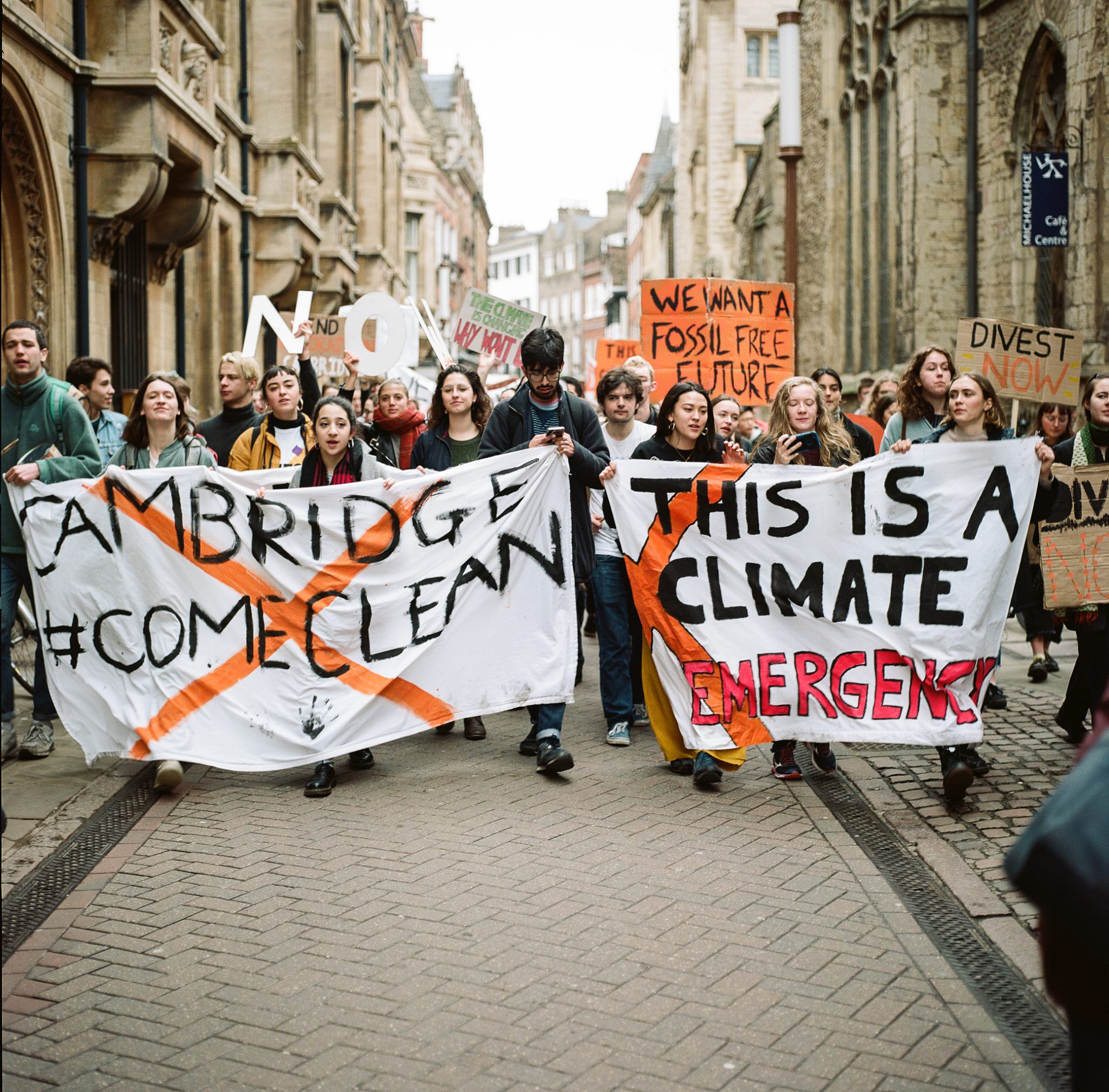
What food campaigners can learn from fossil fuel divestment
Divestment campaigning is more than the process of divesting alone.
I’ve struggled to write this blog. Every time I sit down with the task of writing it, I am met with a strange, unsettling feeling – a collision of hope and defeat. I’ve been involved in divestment campaigning for almost three years now and yet none of the institutions for which I have campaigned have divested from fossil fuels nor arms companies. When I think back to June 8th 2018, the day our university decided to reject fossil fuel divestment after a lengthy process of reviewing the case, when I think of the university’s decision to employ bailiffs to forcibly evict students occupying its central offices in the days running up to the decision, when I think of fossil fuel divestment, I feel deflated. Yet, three years later, I am still campaigning for it. This time it’s for the end of Big Livestock.
That’s not to say that campaigning for divestment hasn’t been successful or effective. The thing about divestment is that, well, it’s not entirely about divesting.
At first glance the way it works seems simple: get institutions to remove their investments from multinational, planet-destroying corporations (historically this has targeted fossil fuels, the arms trade, and South Africa’s system of apartheid). In many cases, the value of divestment is large enough to affect financial strain on these companies. When the world’s largest sovereign wealth fund, Norway’s $1.1 trillion Government Pension Fund, announced its plans to divest from oil and gas last year, 134 companies experienced a plunge of £130m from their combined stock market value. In others where the value of fossil fuel investments is smaller, the act is more symbolic – a signal of solidarity with those on the front lines of climate breakdown. Currently, 79 UK Universities, many with smaller endowments, have announced plans to divest from fossil fuels in some form. Disassociating ourselves from these destructive companies stigmatises them and consequently, BP, ExxonMobil, and Shell have become known as villains.
This is the end goal, but divestment campaigning is more than the process of divesting alone. Especially when, in many scenarios, including my own, the ‘win’ sometimes seems so far away, divestment facilitates a different kind of movement building.
My experiences with Cambridge Zero Carbon Society helped me to engage with issues far beyond the reach of an aggregate of individuals. Zero Carbon, which began in 2007 and re-launched in 2015, has seen hundreds of students involved with the campaign. I spent most of my second and third year of university plotting direct actions, writing press statements, and coordinating campaigners. Targeting the CEOs of the world’s worst corporate polluters now seemed tangible. In protesting events, blockading offices, and occupying our university’s central offices, we were fighting something bigger than us. Fossil fuel divestment has helped shift the narrative away from choices made by individuals and towards the consequences of corporate power. The burden of climate anxiety no longer isolated me but was uprooted collectively.
But the issue of industrial agriculture has lagged. The impact of meat and dairy consumption on the environment is framed as a ‘lifestyle’ issue. We are constantly being bombarded with messages to eat less meat, buy more vegetables, or go vegan and while these can be empowering choices and a step in the right direction, they are not always in our own hands. These are choices overshadowed by the structural issues and corporate powers that monopolise the industry – from systemic racism in access to nourishing food, to the wild success of meat and dairy lobbyists. We’ve moved beyond the conversations about switching off lights and cycling to work, so when it comes to an industry that’s producing 7.14 Gt of emissions each year, why do we continue to emphasise individual consumption? Divesting from Big Livestock will not only cause financial damage to some of the world’s worst polluters, but it will also open up new ways of thinking and talking about food.
By looking beyond our dinner plates and questioning who funds the meat that is on them, we begin to unpack the power structures that prop up this potent industry. Campaigning for divestment exposes the institutions complicit in Amazonian deforestation, the universities that fund slave labour conditions in meatpacking plants, and the museums and galleries that enable land grabbing from indigenous territories. Divestment is effective because it makes tangible the structural issues at play. It forms cross-campaign solidarity so that campaigners can stand with those on the front lines of climate breakdown.
Without sounding like the ‘maybe the real treasure is the friends we made along the way’ meme, the value of divestment campaigns isn’t only in the investments, the bonds, or the billions held in Shell, but the communities of solidarity, we foster in the process.
Image credit – Graham CopeKoga
What can you do next?
Feedback never accepts donations from corporate organisations. To achieve our goal of a food system that nourishes us and the planet, we need your help.
DONATE WHAT YOU CAN NOWDo you believe everyone should have access to nutritious, delicious food - without trashing our planet in the process? Sign up to our mailing list to get the latest on our campaigns.
JOIN THE MAILING LISTFollow us on Facebook for updates on our campaigns and opportunities to get involved.
Get social